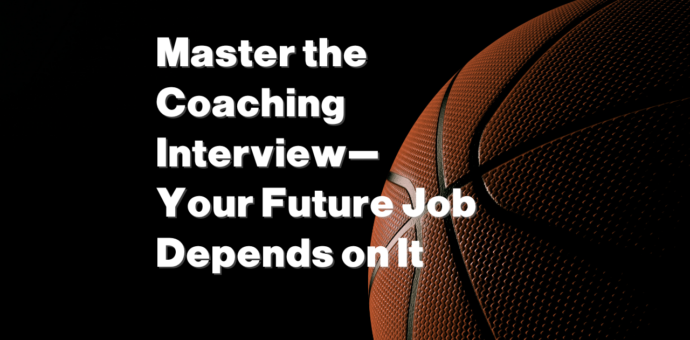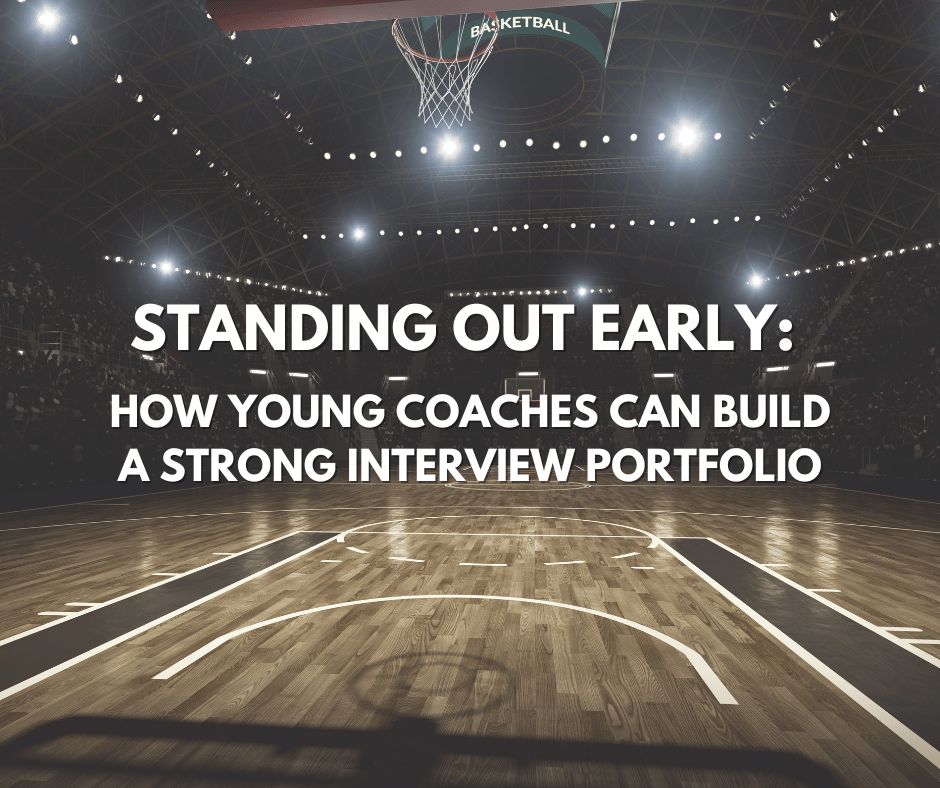Written By: Bill Vasko – CEO, XO Coach & The Coaching Portfolio
If you need help with your coaching resume, your portfolio, or the interview process, be sure to sign up for one of our job prep packages at The Coaching Portfolio! We provide services that assist with all aspects of the job search process for coaches. Click here to get started today!
Introduction
Preparing for an interview is crucial for coaches who want to make a strong impression. Beyond having a solid resume, you need to be able to articulate your coaching philosophy, past experiences, and how you’ll contribute to the program. This article will walk you through common interview questions for coaches and how to craft answers that will help you stand out.
1. The Importance of Interview Preparation for Coaches
Coaching interviews often go beyond standard job interview questions, delving into your philosophy, strategies, and impact on athletes. Preparation is key to confidently conveying your strengths and ensuring your answers align with what hiring committees are looking for. Practicing your responses and having specific examples ready will help you stay composed during the interview.
2. Common Coaching Interview Questions and How to Answer Them
Below are common questions asked during coaching interviews and tips for crafting effective responses:
- “Tell Us About Your Coaching Philosophy.”
- What They’re Looking For: Hiring committees want to understand your approach to developing athletes and building a team culture. They are interested in your core values and how you implement them in your coaching.
- How to Answer: Start with a brief overview of your philosophy, then provide specific examples of how you’ve applied it in your previous roles. For instance, you might emphasize your focus on developing well-rounded athletes who excel on and off the field, then share a story about a player whose academic and athletic performance improved under your guidance.
- “Describe a Time You Overcame a Challenge as a Coach.”
- What They’re Looking For: Employers want to see problem-solving skills, resilience, and the ability to handle adversity.
- How to Answer: Use the STAR (Situation, Task, Action, Result) method. Describe the situation, the challenge you faced, the actions you took, and the outcome. Focus on what you learned and how the experience made you a better coach.
- “How Do You Handle Conflicts Within the Team?”
- What They’re Looking For: Interviewers are interested in your conflict-resolution skills and how you maintain team harmony.
- How to Answer: Explain your approach to resolving conflicts, emphasizing open communication and addressing issues early. Share an example of a time you successfully managed a conflict, describing the steps you took and the result.
- “What Are Your Strengths and Weaknesses as a Coach?”
- What They’re Looking For: They want to assess your self-awareness and willingness to grow.
- How to Answer: Highlight strengths that are directly relevant to the position, such as player development, leadership, or game strategy. When discussing a weakness, be honest but choose something that won’t be a deal-breaker for the role. Explain what you’re doing to improve in that area.
- “How Do You Measure Success as a Coach?”
- What They’re Looking For: They want to understand how you define and pursue goals.
- How to Answer: Discuss various metrics you use to measure success, such as team performance, individual player growth, academic achievements, or improvement in specific skills. Explain how you set realistic but challenging goals for the team and athletes.
- “Tell Us About a Time You Had to Make a Tough Decision.”
- What They’re Looking For: Hiring committees want to know that you can make difficult decisions under pressure.
- How to Answer: Share a story where you had to make a tough call, detailing the factors you considered and the reasoning behind your decision. Emphasize the outcome and what you learned from the situation.
- “How Do You Stay Updated with the Latest Coaching Trends and Techniques?”
- What They’re Looking For: They want to see that you’re committed to continuous learning and staying relevant in the field.
- How to Answer: Mention specific coaching clinics, courses, or certifications you’ve completed. Explain how you apply what you’ve learned to your coaching practices.
Need help learning how to answer tough interview questions? Get a copy of “The Complete Guide to the Coaching Interview” at The Coaching Portfolio!
3. Preparing for Program-Specific Questions
In addition to general coaching questions, you may be asked about the specific program you’re applying to:
- Research the Program Thoroughly:
Learn about the team’s recent performance, coaching staff, and any challenges the program is facing. Familiarize yourself with the school’s values and mission statement. - Be Ready to Discuss How You’ll Contribute:
Explain how your skills and experiences align with the program’s needs. Mention areas where you see opportunities for growth and how you plan to address them.
4. Crafting Questions to Ask the Interviewers
The interview isn’t just about them assessing you; it’s also your opportunity to evaluate the program. Asking thoughtful questions shows your genuine interest:
- “What are the team’s main goals for the upcoming season?”
- This question demonstrates your interest in contributing to the program’s success.
- “How does the program support coaches in their professional development?”
- Shows your commitment to growth and improving your coaching skills.
- “What are some of the biggest challenges the team is currently facing?”
- Allows you to better understand the context in which you’ll be coaching and how you can help.
Need help learning how to answer tough interview questions? Get a copy of “The Complete Guide to the Coaching Interview” at The Coaching Portfolio!
5. Additional Tips for Successful Interview Preparation
Here are some extra steps to ensure you’re well-prepared:
- Practice Mock Interviews:
Have a colleague or friend conduct a mock interview and provide feedback. This will help you practice articulating your thoughts under pressure. - Prepare Your Portfolio:
Bring a coaching portfolio with you (digital or physical) to reference during the interview. Use it to illustrate points and provide examples of your work. - Dress Professionally:
Make sure your attire is appropriate for the setting. Even in sports, first impressions matter, so opt for business casual or a suit depending on the organization’s culture. - Follow Up with a Thank-You Note:
After the interview, send a personalized thank-you note to each interviewer. Mention specific points discussed in the interview to reinforce your interest in the position.
Conclusion
Coaching interviews require more than just explaining your resume; they’re about showcasing your philosophy, problem-solving skills, and ability to lead a team. By anticipating common questions, practicing your responses, and preparing insightful questions of your own, you can set yourself apart from other candidates. Remember, preparation breeds confidence—so take the time to get ready for the big day.
Written By: Bill Vasko – CEO, XO Coach & The Coaching Portfolio
If you need help with your coaching resume, your portfolio, or the interview process, be sure to sign up for one of our job prep packages at The Coaching Portfolio! We provide services that assist with all aspects of the job search process for coaches. Click here to get started today!






